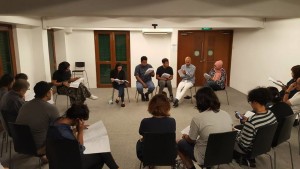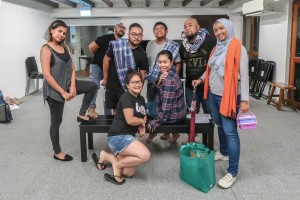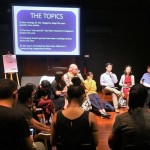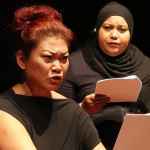
It took playwright Nabilah Said more than three years to get her play from conception to staging.
Sitting across from me at the café outside the National Library, Nabilah Said is relaxed, confident, and slightly giddy from the excitement and exhaustion of back-to-back rehearsals.
“Rehearsals are great! They have been sooooo fun!” she gushes. “It’s funny because I’m sure this kind of ‘I love rehearsals!’ feeling is something that everyone else in theatre had already gone through when they were quite young. But I think as a playwright, if you’re not doing it full time, there are so many things that allow you to build walls. But now those walls are no longer there.”
Three years ago, however, she was in a very different place. “My heart squeezes and I feel terrible,” she wrote in a reflection piece dated 15 June 2016.
Back then, she had spent a year trying to write a play called State Land under Boiler Room, Centre 42’s script development programme, about people who used to live on Singapore’s offshore islands before being forced to move to the mainland. At the same time, as an associate artist in residence at Teater Ekamatra, she was also working on another piece called Angkat, about the common and informal practice of adoption in Malay families. (Anak angkat means “adopted children” in Malay.)
For various reasons, however, she just couldn’t bend or twist either of those projects into the shape and form that she wanted. That was when Robin Loon and Casey Lim – Boiler Room’s resident dramaturg and director respectively – suggested that she should take a six-month break before returning to it with more focus. She understood where they were coming from and gratefully accepted their offer, but nonetheless felt frustrated that it had come to that.
“It is a strange sort of heartbreak,” she wrote in another reflection piece on 1 July 2016 as she began her hiatus.
It turns out that the break was exactly what she needed. By January 2017, she was ready to pick up her Boiler Room journey where she left off, having decided to incorporate her ideas for State Land into Angkat.

A test read of “Angkat” was held at Centre 42 in September 2017 to conclude Nabilah’s Boiler Room journey.
“I want to look at both adoption, and the relationship between the former islanders and mainland Singapore. Because to me there is a parallel journey of how you started from one place and moved to another,” she says. “Even if you feel like you’re okay with the new place, there must be some feelings still tied to the former place. So I felt that the two journeys could be looked at in the same play.”
She finished her new draft of Angkat in September 2017, and held a test read at Centre 42 to conclude her Boiler Room journey.
Meanwhile, Teater Ekamatra had informed Nabilah that they would like to stage the piece in December 2017, but felt that the script still wasn’t quite ready. They came to a mutual agreement to allow the director of the production, Irfan Kasban, to devise new scenes together with the cast, taking the production in a different direction.
“With the benefit of hindsight, I totally understand some of the concerns they had, and some of the weaknesses of the script at that point in time, and why they wanted to simplify it. It’s fine that they [devised the play that way],” she says. “But I also felt that this story that I had initially wanted to tell – I still wanted to tell it.”
And so in January 2018, Nabilah reached out to director Noor Effendy Ibrahim, whose work she really admires, and asked if he would like work with her to further develop her original idea for Angkat. He said yes, and together, they submitted the piece to the M1 Singapore Fringe Festival open call shortly after. To their delight, Angkat was accepted for the 2019 festival.
Since November 2018, Nabilah has been back at Centre 42 together with Effendy, her dramaturg Zulfadli Rashid (aka “Big”), and the rest of her production team to further develop and fine-tune her play under our Basement Workshop residency programme. She has also extended the title of the piece to better reflect her story. It’s now called ANGKAT: A Definitive, Alternative, Reclaimed Narrative of a Native.
“I always felt that the title Angkat by itself didn’t fully capture the ambition of the play. It would have made people think that the play was only about the adoption story. Plus, I want to find a way to give people a sense that this play is going to be a bit siao siao one (Singlish for “crazy”)!” she smirks. “I did not want a boring title.”
Which brings us to the “I love rehearsals!” phase that Nabilah is enjoying these days.

The cast and creative team of “ANGKAT: A Definitive, Alternative, Reclaimed Narrative of a Native” are currently in residence at Centre 42.
“The thing about the play is that there are a lot of funny moments. Like, a lot. So sometimes in rehearsals we can’t actually finish reading it, because we’re too busy laughing!” she shares. At the same time, she’s also feeling more assured, knowing that she is well-supported.
“It feels really nice that even now, when it’s no longer about the script anymore – rather it’s about the production – that we can still work with Centre 42 to develop it. And it’s cool that Ekamatra is still a part of my journey as well; they’ve been very supportive. To me it signals that there’s confidence about the piece, which I really need as a playwright,” she says. She pauses, and bursts out laughing. “It sounds so terrible! I sound so needy! But for me, it’s really important that the people I’m working with believe in it.”
On top of working out the story that she wanted to tell with ANGKAT, Nabilah also spent the last three years trying to find her voice and place as a playwright. And now, she has not just one, but three plays that will all be debuting in January 2019: ANGKAT and yesterday it rained salt will both be staged at the M1 Singapore Fringe Festival, while Inside Voices will be performed at London’s Vault Festival. It may have taken her a while to get to where she is today, but the journey from idea to production was never meant to be straightforward.
“I started out being unsure, but now it’s a complete 180-degree change, you know. I’m like very, very, very sure,” she says. “And I feel like it did require those three years of work for me to figure out what it is that I’m trying to say.”
By Gwen Pew
Published on 11 January 2019
ANGKAT: A Definitive, Alternative, Reclaimed Narrative of a Native will be performed at NAFA Studio Theatre from 24 to 26 January. Tickets are available here.





